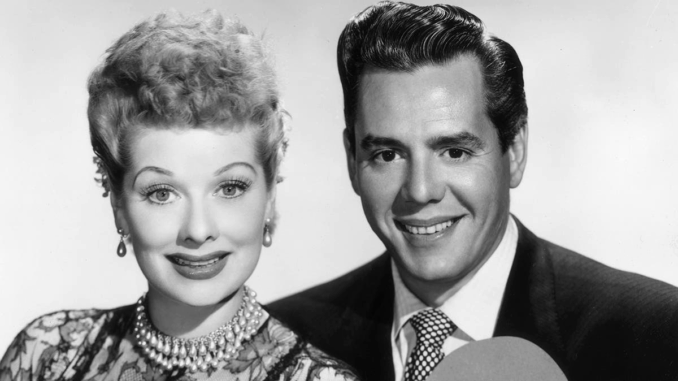
The Unstoppable Legacy: Why Lucille Ball Is Still the Undisputed Queen of Comedy
Seventy years after she first slipped on a dress and smeared her face in a chocolate factory, Lucille Ball remains an undeniable force in the world of television comedy. As the star of I Love Lucy, she created a character and a show that were not just funny but groundbreaking. In an era when television was a new and uncharted territory, Ball, along with her brilliant husband and business partner Desi Arnaz, built an empire that would fundamentally change the way shows were made, financed, and consumed.
Her influence, however, goes far beyond the laugh track and the famous “Vitameatavegamin” scene. It is a legacy that is woven into the very fabric of modern television, and it is why, even today, she is still the undisputed queen of comedy.
1. The Power of Physical Comedy: A Masterclass in the Art of Laughter
Lucille Ball was a master of physical comedy, a gifted performer who could get a laugh with a simple facial expression or a perfectly timed fall. She was fearless in her pursuit of a laugh, and her dedication to the craft was unparalleled. In a television landscape where most comedians relied on punchlines and witty dialogue, Ball was a pioneer who used her body as a tool for comedy.
Her most iconic scenes—the grape-stomping, the chocolate factory fiasco, the “Vitameatavegamin” commercial—are not just funny; they are works of art. They are a testament to her genius and her willingness to do whatever it took to get a laugh. Her influence can be seen in every physical comedian who has followed her, from Carol Burnett to Melissa McCarthy. She taught an entire generation of performers that a simple stumble or a well-placed pratfall could be just as powerful as a perfectly delivered one-liner.
2. The Business Genius: The Woman Who Revolutionized Television Production
While Ball was a brilliant performer, her true genius lay in her business acumen. As the co-owner of Desilu Productions, she and Desi Arnaz were pioneers who took a massive risk on a new medium. They insisted on filming their show on 35mm film with a three-camera setup, a radical idea that was unheard of at the time. This decision, which was initially met with resistance from network executives, would change television forever.
The three-camera setup, which is still the standard for sitcom production, allowed the show to be filmed in a live setting, with the cameras capturing every angle of the action. This not only saved time and money but also created a more authentic and intimate viewing experience. It allowed the show to have a live audience, and the genuine laughter you hear in the background is the real deal.
But their business genius didn’t stop there. Arnaz and Ball had an unwavering belief in the power of syndication. By filming the show on high-quality film, they ensured that it would look just as sharp and clean decades later. The show became the first in television history to be syndicated, and it became an absolute cash cow for Desilu Productions. This business model, which is now a standard in Hollywood, was a direct result of their foresight and their willingness to take a chance on a new medium.
3. The Feminist Icon: A Woman in Charge
In an industry dominated by men, Lucille Ball was a force to be reckoned with. She was the first woman to preside over a major studio, and she used her power to challenge the status quo. She fought for her husband’s casting, she insisted on incorporating her real-life pregnancy into the show, and she created a character who was a a powerful, independent woman in a time when most female characters were relegated to the background.
Lucy Ricardo was not a one-dimensional character. She was a woman with a fierce desire for independence and a passionate love for her husband. She was a woman who was not afraid to take risks, to make mistakes, and to get back up and try again. Her character was a powerful and necessary counterpoint to the more traditional female characters of the time, and her legacy can be seen in every female character who has followed her.
Ball’s influence can also be seen in the countless female comedians who have followed in her footsteps. She was a trailblazer who showed an entire generation of women that they could be funny, smart, and in charge. She was a role model who inspired women to take risks, to challenge the status quo, and to fight for their place in an industry that was not built for them.
4. The Enduring Legacy: A Timeless Classic
Seventy years later, I Love Lucy is still one of the most beloved and successful shows in television history. Its humor is timeless, its characters are unforgettable, and its themes of love, family, and friendship are universal. The show has been in continuous syndication since its premiere, a testament to its enduring power.
Its influence can be seen in every sitcom that has followed it, from Seinfeld to Friends to The Office. The show’s use of a live studio audience, its focus on character-driven storytelling, and its ability to blend humor and heart are all a direct result of Ball and Arnaz’s genius.
Lucille Ball was more than just a comedian; she was a visionary who changed television forever. She was a performer who was not afraid to take risks, a businesswoman who was not afraid to challenge the status quo, and a feminist icon who was not afraid to be a woman in charge. Her legacy is a powerful one, and it is a reminder that even after 70 years, she is still the undisputed queen of comedy.